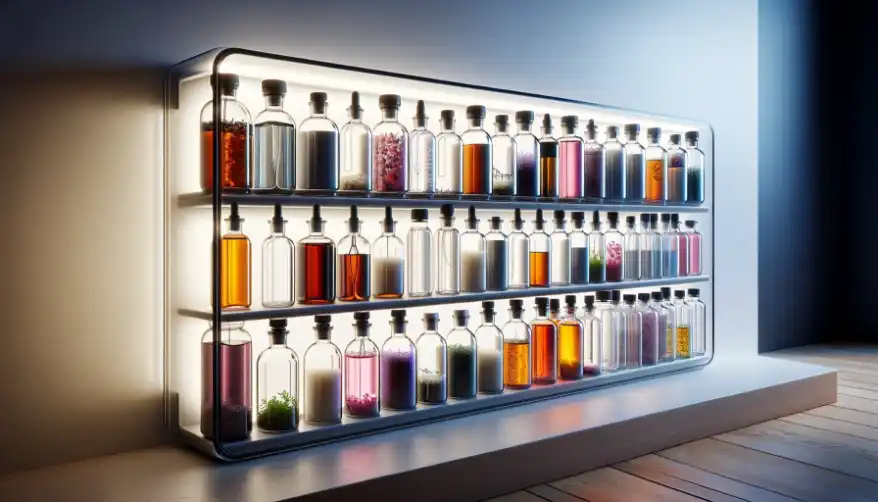Do Essential Oils Break Down Plastic?A Complete Guide
Essential oils are highly concentrated plant extracts that provide various therapeutic benefits. From lavender oil for relaxation to tea tree oil for skin health, essential oils can be incredibly useful.
However, to maintain their integrity and potency, essential oils need to be stored properly.
This raises questions around using plastic containers. Can essential oils break down plastic? The short answer is – it depends on the type of plastic and oil.
Keep reading to learn all about how essential oils interact with plastic, along with tips for proper storage.

Types of Plastics and Their Reactions to Essential Oils
There are seven major types of plastic designated by resin identification codes. These codes are the numbers in the recycling symbols you see on plastic containers:
- #1 PET (Polyethylene Terephthalate)
- #2 HDPE (High-Density Polyethylene)
- #3 PVC (Polyvinyl Chloride)
- #4 LDPE (Low-Density Polyethylene)
- #5 PP (Polypropylene)
- #6 PS (Polystyrene)
- #7 Other (BPA, polycarbonate, nylon)
The plastics considered safe for essential oils are PET and HDPE. These are durable plastics that don’t degrade or leach chemicals when in contact with concentrated essential oils.
I prefer to use amber glass bottles for storing pure essential oils. However, PET and HDPE plastic are decent alternatives, especially for diluted oils.
On the other hand, oils like lemon and wild orange contain compounds called limonene that can break down plastics like polystyrene. The limonene molecules disrupt the molecular structure of the polystyrene plastic, causing it to dissolve.
So it’s important to avoid polystyrene and other fragile plastics when working with citrus and many other essential oils.
Factors That Determine Plastic Breakdown
There are a few key factors that determine whether an essential oil will degrade plastic:
Purity of the Oil
Pure, undiluted essential oils have highly concentrated plant compounds and phytochemicals.
This gives them their potent therapeutic benefits. However, it also makes them more likely to react with fragile plastics. Always store pure, undiluted oils in glass or HDPE plastic only.
Diluted oils mixed into DIY products are much less concentrated. The carrier oils balance out the potency, making plastic degradation less likely. So diluted oil blends can go into PET and HDPE plastics.
Dilution Ratio
The more diluted an essential oil, the less it will interact with plastic. Oils diluted in a 1:1 ratio with carrier oils have a lower chance of degrading plastic than pure, undiluted oils. For DIY recipes like homemade cleaners, aim for at least a 1:3 dilution ratio.
Temperature Resistance
HDPE plastic has a higher heat tolerance than PET. The maximum temperature resistance for HDPE is around 167°F versus 131°F for PET plastic. So HDPE may be better for essential oils that get stored in hot conditions.
Both plastics become brittle and degrade faster when exposed to freezing temperatures.
Reusing Plastic Containers
It’s best to avoid reusing plastic containers that stored pure essential oils. The compounds can get absorbed into the plastic, causing breakdown over repeated use. Use new HDPE or PET containers instead.

Best Practices for Storing Oils
To keep your precious oils in top condition, follow these storage best practices:
- Store pure, undiluted oils in amber or blue cobalt glass bottles to limit light exposure. I love these amber glass bottles because the colored glass protects the oils. The UV-blocking bottles come in a set of 5 sizes (5ml, 10ml, 30ml, 50ml, and 100ml) so you can organize different oils.
- Diluted essential oil blends can go into HDPE or PET plastic bottles. However, HDPE provides better UV light protection if storing for extended periods. These HDPE bottles are great for DIY projects.
- Use stainless steel or glass containers and utensils for mixing and making DIY recipes with essential oils. Avoid using plastic stir spoons or mixers as the oils can degrade the plastic.
- Keep all essential oils in a cool, dry place away from heat and light sources. Light and warmth degrade both plastic and essential oils. A dark pantry or cupboard is ideal for storage.
- Refrigerate any carrier oils before using them to dilute essential oils. The cool environment helps prolong their freshness. Transfer diluted blends to proper glass or plastic bottles for storage.
Safety Tips for Using Essential Oils
To avoid injury or reactions, keep these safety tips in mind when using essential oils:
- Never ingest an essential oil unless the manufacturer specifically approves it for internal use. Oils meant for ingestion should be taken only according to label instructions. Always use a glass or PET plastic bottle as the container.
- Properly dilute essential oils before applying them to skin. Pure oils can cause burns. Use a carrier oil to dilute them prior to topical use. Do a patch test as well to check for reactions.
- Avoid getting pure essential oils near the eyes, nose, mouth or other mucous membranes. Wash immediately with a carrier oil if this occurs.
- Don’t use plastic utensils, droppers or containers with pure essential oils unless you immediately wash them. The concentrated oils cling to the plastic and can get absorbed over time.
- Check plastic bottles and containers frequently for any warping, cracks, clouding or breakdowns if storing essential oils long-term. Discard and replace degraded plastic to be safe.
Properly storing essential oils is crucial for maintaining their therapeutic quality and extending their shelf life.
Certain oils can degrade plastic containers and bottles over time. But this effect depends on the type of plastic resin, concentration of the oil, heat and light exposure among other factors.
Taking the proper precautions allows you to safely leverage the benefits of these powerful plant extracts.

